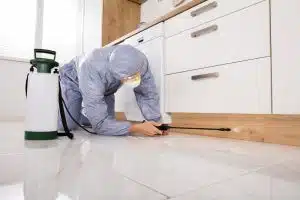 The pest control sector has witnessed significant trends and developments in recent years, reflecting both advancements in technology and changing environmental and regulatory landscapes.
The pest control sector has witnessed significant trends and developments in recent years, reflecting both advancements in technology and changing environmental and regulatory landscapes.
One notable trend is the increasing demand for sustainable and eco-friendly pest control methods. As concerns about the environment and human health grow, there has been a shift towards non-toxic and chemical-free pest control solutions, such as integrated pest management (IPM) and the use of natural predators.
Additionally, the digital transformation has played a crucial role in the industry, with the adoption of smart pest control technologies like remote monitoring and data analytics to optimize treatment strategies and improve efficiency.
Moreover, stricter regulations and heightened awareness of public health have pushed for greater transparency and accountability within the sector, emphasizing the need for certified and trained pest control professionals.
These trends reflect a growing commitment to more responsible and effective pest control practices in both residential and commercial settings
What has been happening in the pest control sector?
The pest control sector has seen remarkable transformations in the last couple of decades:
Firstly, there has been a noticeable shift towards eco-friendly pest control practices, with a growing emphasis on controlling pests without resorting to pesticides. Consumers’ environmental concerns, as well as worries about the impact of chemicals on pets and human health, have driven this trend. Some individuals even prefer relocating pests rather than exterminating them, reflecting a broader awareness of sustainability.
Secondly, businesses now face mounting pressure to adopt robust pest control measures due to increasingly stringent regulations. The threat of legal action for non-compliance has made businesses more vigilant in implementing effective pest control programs. Consequently, there is now greater emphasis on preventive measures such as proofing premises against infestations.
Thirdly, the sector has had to adapt to the effects of climate change, particularly the warming climate in Britain, which has enabled more exotic pests to thrive. This has required innovative approaches and strategies to tackle emerging pest challenges effectively.
These developments underscore the evolving nature of the pest control sector, driven by environmental consciousness, regulatory pressures, legal concerns, and the changing climate.
In 2012, the Health and Safety Executive (HSE), serving as the UK’s authority on pesticides, initiated a consultation aimed at mitigating the environmental risks associated with anti-coagulant rodenticides, commonly known as rat poisons. This pivotal effort led to the establishment of core principles for a rodenticide stewardship scheme within the pest control industry in 2015. This scheme operates as a self-regulatory framework, overseen by the Campaign for Responsible Rodenticide Use, effectively reshaping industry practices.
In June 2016, a momentous shift occurred as only certified and trained individuals gained authorization to purchase and employ ‘professional only’ anti-coagulant rodenticides, underscoring a heightened focus on safety and competence.
A comprehensive report released by the Campaign for Responsible Rodenticide Use, accessible through the National Pest Technicians Association website, underscored the detrimental impact of routine permanent baiting with rodenticides on wildlife. Their findings revealed that small mammals, attracted to the bait, subsequently became prey for a wide array of predatory birds and mammals. While recognizing occasional merits of permanent baiting, particularly indoors, the report strongly advocated against its routine application in rodent pest management. It recommended reserving such practices only when justifiable by ongoing threats to human or animal health and hygiene.
Notably, by the close of November 2015, stringent requirements mandated that anyone handling professional pesticide products obtain a ‘specified certificate,’ verifying their competence in the safe and appropriate use of these substances.
Moreover, 2015 ushered in new EU regulations necessitating the listing of all biocidal products on the ‘Article 95 list’ for those placed on the market. This regulation led to the withdrawal of certain products. Despite the UK’s decision to leave the EU in June 2016, all existing EU regulations continued to apply until the departure date. The future stance regarding the retention or adoption of EU regulations remained uncertain, with indications that many existing regulations might persist to align with the remaining EU member states’ practices.
As projected by the British Pest Control Association (BPCA), the future landscape of the pest control sector in the UK is poised for several key developments:
- Elevated Professionalism: Anticipating consumer demands for greater professionalism, pest control operatives will need to undergo higher levels of training and develop a deeper understanding of the issues they confront. This shift reflects a growing emphasis on competence and expertise within the industry.
- Shift Towards Pest Management: The sector will continue to steer away from traditional pest control methods, placing more focus on pest management strategies such as pest-proofing premises. This proactive approach aims to prevent infestations rather than simply addressing existing pest problems.
- Precise Pesticide Usage: Expect a reduction in the use of pesticides, with a preference for fewer but more precisely targeted pesticide applications. This approach aligns with both environmental concerns and evolving regulations.
- Rising Public Awareness: Increasing public awareness of pest issues, including concerns like dust mites, will drive up demand for pest control services. As people become more informed about potential health hazards associated with pests, the need for effective solutions will grow.
- Heightened Price Competition: The industry is likely to witness greater price competition as more providers enter the market to meet the rising demand. This competition could lead to cost-effective solutions for consumers.
However, it’s worth noting that the pest control sector has faced challenges in recent years. Economic difficulties and funding cuts in the late 2000s and early 2010s prompted many local authorities to reduce or discontinue pest control services. While this had a negative impact on some businesses reliant on public sector contracts, it may have reduced competition for other pest control specialists.
Despite an economic recovery during the mid-2010s, local authority finances remained strained. The economic resurgence stalled toward the end of 2015, and the uncertainty stemming from the Brexit vote in June 2016, combined with ongoing negotiations, kept the economy sluggish through 2016, 2017, and 2018. As a result, consumers, businesses, and local authorities have had to tighten their budgets and prioritize essential spending. The economic outlook suggests that improvements may not be imminent in the near future.
Keeping up to date with developments
Engaging with a trade association serves as a valuable means of staying informed about the latest industry advancements and maintaining a competitive edge. In the UK pest control sector, two prominent professional bodies take the lead:
- The British Pest Control Association (BPCA): Committed to elevating industry standards, the BPCA offers a comprehensive range of member services. Notably, it provides members with access to training courses that equip them with the knowledge and skills required to excel in the field. For those seeking to keep abreast of industry developments and connect with fellow professionals, the BPCA is an indispensable resource.
- The National Pest Technicians Association (NPTA): As a staunch advocate for professionalism within the industry, the NPTA plays a pivotal role in promoting excellence. One of its noteworthy publications, “Today’s Technician,” serves as an informative platform for staying updated on industry trends and insights. By aligning with the NPTA, professionals can tap into valuable resources and network with peers to further their careers.
For in-depth information about the full spectrum of member services offered by these esteemed organizations and to access their contact details, a visit to their respective websites is highly recommended. In doing so, industry professionals can harness the wealth of knowledge and support available to excel in the dynamic field of pest control.
Conclusion
In conclusion, the pest control industry in the UK is witnessing a significant transformation, driven by a range of factors. As the sector adapts to the evolving environmental and regulatory landscape, several notable trends have emerged. These include a shift towards eco-friendly and pesticide-free solutions, an increased emphasis on professionalism and training, a growing focus on pest management rather than mere control, and heightened awareness among the public about pest-related health concerns.
Moreover, the industry has navigated economic challenges and funding cuts, all while striving to maintain high standards of service. Engaging with professional bodies like the British Pest Control Association (BPCA) and the National Pest Technicians Association (NPTA) has become essential for pest control professionals to access valuable resources and stay abreast of these dynamic sector trends. In this rapidly evolving field, adaptability and a commitment to best practices will remain pivotal for success in the UK’s pest control industry.
Lee Jones is a seasoned Business Finance Specialist with over two decades of invaluable experience in the financial sector. With a keen eye for market trends and a passion for helping businesses thrive, Lee has become a trusted advisor to countless organizations seeking to navigate the complexities of finance.


